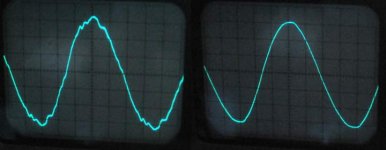Line frequency is locked to the generators mechanical rotation (every one on the grid) and is very stable. Old electric clocks used ac motors whos speed depended on the line freq. And some of them were acurate to within minutes a year.
Much better than that in fact, but only as along term average.Line frequency is locked to the generators mechanical rotation (every one on the grid) and is very stable. Old electric clocks used ac motors whos speed depended on the line freq. And some of them were acurate to within minutes a year.
Short term large scale load changes cause temporary frequency changes until generation capacity can be adjusted
But mains frequency should only be important for turntables
You've misread the answer. The difference is noise. It may not be the answer that you were looking for, but it has the virtue of being correct.
It has the virtue of being claimed to be correct. I'd though say that's no virtue at all, just marketing. The poster asked about the sound - in other words something experienced through our ears. Noise is certainly a difference in the signal, but the difference perceived is in the areas mentioned - soundstaging, imaging and I'd add sibilance. <edit> That is assuming that the noise signal is not gross, like clicks from AC compressors and the like.
Last edited:
Not just clicks; buzzes, hash, and whines.
What does 'hash' sound like to you? I agree that buzzes and whines are sounds.
The other stuff is fanciful.
Soundstage depth is fanciful? You're having us on.😀
What does 'hash' sound like to you? I agree that buzzes and whines are sounds.
Best analogy I can give you is maracas.
How common is a clipped sine wave from the mains supply and what causes it?
Never seen one.
Never seen one.
The mains can be pretty ugly. However, I think the most important question is as follows: If bad stuff on the mains is inaudible, or not visible on the output of the amplifier when a scope is connected with high sensitivity, then will it affect the sound?
One might argue that out-of-band EMI on the mains that sneaks through only makes a difference when program material is present (by means of intermod), which is when the "noise" effects of same would be masked but the sound quality effects might not be masked. To what extent this is a stretch is unclear.
Cheers,
Bob
How common is a clipped sine wave from the mains supply and what causes it?
Too normal here, where there are few resistive loads like heaters and bulbs.
Cheap PC power supplies and striplights with ballasts that are more resistor than choke clip the mains to a flat top
capacitor input filters hung on the other side of transformers also load up the peaks of the sinewave. Seems like everyone is responsible for the waveform distortion.
Dirty or not?
Speaking of clean power and how to get it, I remembered that we have a 12KW backup generator here that is powered from the gas line. I fired it up the other day to have a look at the waveform.
Below is a comparison of the mains power in my shop on a weekday afternoon vs the AC out of the 12KW generator. Both taken from the same receptacle that the o'scope is plugged into.
Can you guess which is which?
Speaking of clean power and how to get it, I remembered that we have a 12KW backup generator here that is powered from the gas line. I fired it up the other day to have a look at the waveform.
Below is a comparison of the mains power in my shop on a weekday afternoon vs the AC out of the 12KW generator. Both taken from the same receptacle that the o'scope is plugged into.
Can you guess which is which?
Attachments
yes, but they attenuate at HF far better than they are able at LF.
They are good at reducing spikes on the mains waveform.
They are good at reducing spikes on the mains waveform.
Can these things help minimize mains noise?
Yep, as Andrew says they can't do much for lower frequency RF. And for higher frequencies, they're only as good as your earth connection, which in many cases is poor due to having high inductance. They also have caps from both lines to ground, so increase earth leakage current - use with caution and find the one with the current rating that best suits your equipment. Use a medical specified one if low earth leakage is wanted, but these tend to have poorer rejection characteristics. Also use a VDR on the input to deal with spikes.
right one is the mains
Correct!

You must have seen generator power before. I was surprised how dirty it was.
- Status
- Not open for further replies.
- Home
- Amplifiers
- Solid State
- mains quality variation

